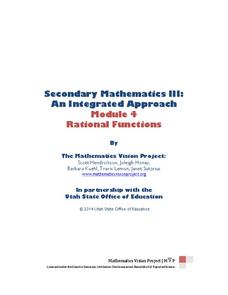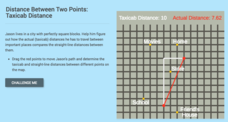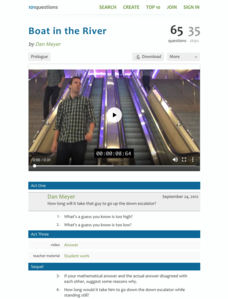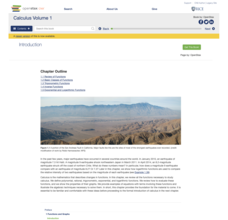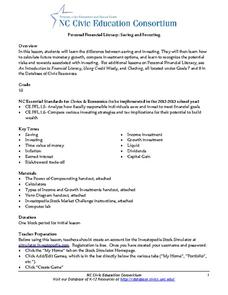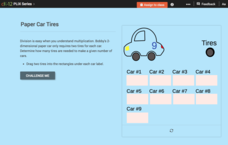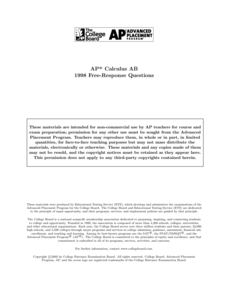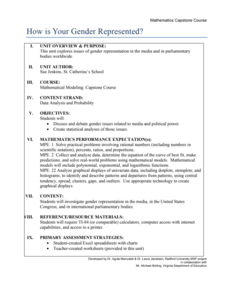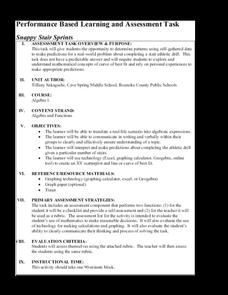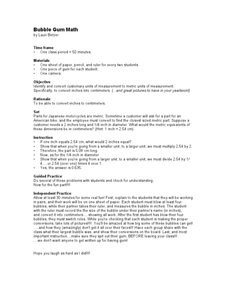Portland
State
University
Historical Reflections on the Fundamental Theorem Of (Integral) Calculus
Highlight the process of mathematical discovery for your classes. This lesson examines the development of the Fundamental Theorem of Calculus over time. Understanding the history of the theorem helps create a better understanding of the...
Mathematics Vision Project
Module 4: Rational Functions
Time to study the most sensible function — rational functions! The seven-lesson unit develops the concept of a rational function through a connection to rational numbers and fractions. Scholars graph functions, solve equations, and...
CK-12 Foundation
Distance Between Two Points: Taxicab Distance
Apply geometry to find the distance as the crow flies. An engaging lesson compares the distance a car must drive to the straight line distance between two locations. Scholars must manipulate a simulation, note the change in distances,...
CK-12 Foundation
Angle Measurement: Fuel Gauge Angles
Once you start looking, angles appear everywhere in our daily lives. A creative lesson has learners use the angles created by a fuel gauge to practice the Angle Addition Postulate. They see how changing the angle parts does not...
101 Questions
Boat in the River
Ever feel like you're headed up the down escalator? Don't let your pupils get stuck in that rut! Practice writing equations to solve a problem using an engaging lesson. A video presents information that allows learners to determine how...
Rice University
Calculus Volume 1
Differentiate between calculus concepts. The beginning of a helpful calculus resource begins with a short review of functions and moves right into limits to define derivatives. The six-chapter resource continues with applications of...
Curated OER
Mystery Spinners
Take a spin with probability. Given a set of clues about the probability of events on a spinner, groups create their own device to match the clues. Using a jigsaw strategy, groups share their spinners and strategies with other...
Radford University
Are You Faster than Bacteria?
Just how fast does bacteria grow? Over the course of three lessons, pupils investigate exponential growth with the use of bacteria growth. During the lesson, bacteria from a cell phone is grown to make a connection to real life. Using...
Scholastic
Pattern Block Maze
Spice up your traditional lesson on divisibility with a puzzle! Learners work to find their way through a maze by crossing over numbers that are not divisible by 2, 3, or 4.
Illustrative Mathematics
Field Day Scarcity
Introduce young mathematicians to concepts of financial literacy with this open-ended word problem. With seven dollars to spend during field day and given a list of available items and their prices, children must determine how they want...
Carolina K-12
Personal Financial Literacy: Saving and Investing
When should you save, and when should you invest? In considering this question, your class members will also learn about the time value of money, inflation, compounded interest, and income/growth investments. The resource also outlines...
Mathwire
Shamrock Paths
What could St. Patrick's Day and Pascal's triangle possibly have in common? Trace the pattern in a holiday-themed worksheet that prompts learners to find the word shamrock as many times as they can.
CK-12 Foundation
Single Variable Division Equations: Paper Car Tires
Don't tire of solving equations, mix up your lesson! A virtual interactive has users drag paper tires to toy cars. Solving a one-step equation lets them find how many cars can be made from a given number of tires.
CK-12 Foundation
Broken-Line Graphs: Heating Curve of Water
Examine the unique graphs coined broken-line graphs. Using the phase change of water for data, learners answer questions related to the temperature and energy at different times in the cycle of the phase change. Questions focus on the...
CK-12 Foundation
Two-Sided Stem-and-Lead Plots: Gamers
Which gender spends more time playing video games? Your classes use provided data to answer this question. They first build a two-sided stem-and-leaf plot and then use the display to look for patterns. Guiding questions help them...
101 Questions
Slow Church
The church that just can't stay put! A video presentation raises questions of just how far the church will move. Presented with the rate of movement and a range of time expected, scholars build an inequality to answer the question.
College Board
1998 AP® Calculus AB Free-Response Questions
Take a peek into the exam. Released items from the Calculus AB exam provide pupils insight into how questions appear on the exam. The six questions range from finding the area under a curve and the volume of the revolution to working...
Radford University
Government Spending
Spend some time with lines of best fit. An informative unit has learners investigate government spending. They research data on poverty, educational spending, social security, and defense spending, and then analyze lines of best fit for...
Radford University
How Is Your Gender Represented?
Does the media shape people's views on gender? Scholars use data on gender portrayal in magazines to explore the idea. They use a spreadsheet program to create bar graphs and perform a chi-square test. They also use provided data to...
Radford University
Pirate Attack
Arr ye matey, it's time for some trig. Learners first read up on the 2010 attack on the USS Nicholas by a group of pirates and the testimony of one of the witnesses. They use right triangle trigonometry to determine if the account is...
Radford University
Curve of Best Fit
Don't watch the resource go down the drain. Scholars perform an experiment where they measure the amount of water that flows from a funnel over time. They use the data to create graphs and find the curves of best fit.
Radford University
Modeling Statistical Data
Can people predict the number of future divorces? Scholars research and analyze data on the number of divorces and teenage pregnancies in Virginia over time. They use the data to create graphs, determine the best-fit equations, and make...
Radford University
Snappy Stair Sprints
Let's go for a run. Small groups determine a way to collect data to determine the time it would take to run a set of stairs. After creating a plan, teams collect data and graph their results, calculating the equation of best fit and...
Curated OER
Bubblegum Math
Here is a lesson on how to convert inches to centimeters using bubblegum. In this measurement lesson plan, learners get into partners and blow bubbles. One student blows bubbles while the other measures the bubble in inches. Then the...



